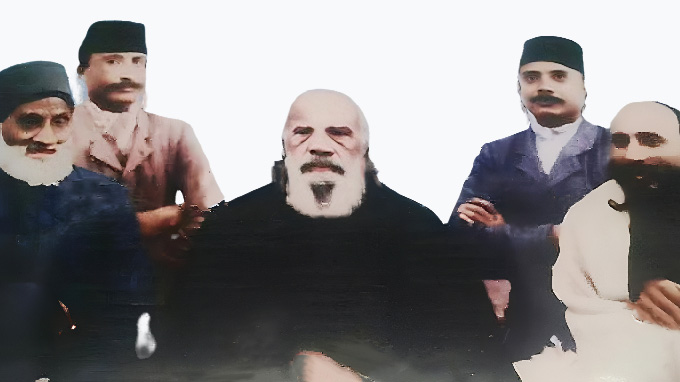Fazihat Shah Warsi
Zahoor Ali (later known as Fazeehat Shah Warsi) was born to Noor Ali around 1830 AD in Gaya district of Bengal (now Bihar), India. Noor Ali, a prominent educated family of Bazidpur, was the Diwan (Present day Finance Minister) of the Choubiis Pargana region of Bengal, British India. These were the same areas of Bengal that Robert Clive leading the British East India Company forces, seized after decisively defeating Siraj ud Daulah, the Nawab of Bengal, in 1757 marking a pivotal moment in British colonial expansion in India.
Zahoor Ali was tall, strong, handsome and possessed both knowledge and insight. As the Diwan's only son, he grew up in an environment

From childhood to youth, he embarked on a journey driven by a passion for learning and a desire to achieve the unattainable, with a keen interest in demonstrating and honing his abilities. Initially, he pursued mastery in horsemanship. Not only could he control and race horses, but he also perfected the skill of picking up a wooden peg from the ground while riding at full speed. In his youth, he developed a desire for and necessity of mastering wrestling. At that time, Wrestling was not just about overpowering someone, in noble families, it was seen as an essential part of family tradition and a source of pride for young men.
Zahoor Ali's restless nature inclined him to learn the science of alchemy under the supervision of expert teachers, mastering it with the instruction that the secret formula must not be divulged. After mastering alchemy, Zahoor Ali's mind turned towards understanding the majority of non Muslims of that time by learning their religeous books. He studied Gita (a Hindu scripture) to understand the beliefs of Hindus. Having acquired mastery over all prevalent sciences, he felt that he had finally comprehended everything.
During adult life he was a Tehsildar (present day district collector) of the Bazidpur and surrounding region.
In a dream one night, he saw that Hazrat Peer and Murshid Musafir Shah Sahib were saying that Hazrat Waris Ali Shah had stopped at Barh (a town in Bihar India). He is a godly man and extraordinary beings, go and meet him. Hazrat Waris Ali Shah (1817–1905) was a Sufi saint from Dewa, Barabanki, India, and the founder of the Warsi Sufi order. He arrived at the Barh the next morning on his horse. Hazrat Waris Ali Shah embraced him awarded the title of ‘Fazeehat Shah’ and included in in Warsi order.
For many years Fazeehat Shah spent his time with Hazrat Waris Ali Shah in Barabanki learning from him Warsi teachings,

In the village of Bazidpur, the atmosphere of brotherhood grew. Due to mingling with each other and the company of the elders of the faith, there was an increase in religious knowledge along with worldly life being lived in accordance with divine commandments. Whoever wanted was accommodated in gatherings in the courtyard. Sometimes there would be gatherings of the physicians. Various medicines were grinded and filtered, along with recitations and prayers. Some were preserved in the form of powders, while others were prepared in the form of pills so that the needs of the people could be met.
Fazeehat Shah expressed himself in a delightful manner in both Persian and Urdu.
Fazeehat Shah Warsi passed away in 1905 and rests peacefully outside the courtyard of the Bazidpur Mosque. Every year on the 28th of Zul-Hijjah, there is a gathering of Warsi brothers here. People come to recite the Holy Quran and offer prayers for the salvation of his soul. The 28th of Zul-Hijjah marks the date of his passing. He is survived by his sons - Abul Hasan, Ali Kareem and Mehdi Hasan.